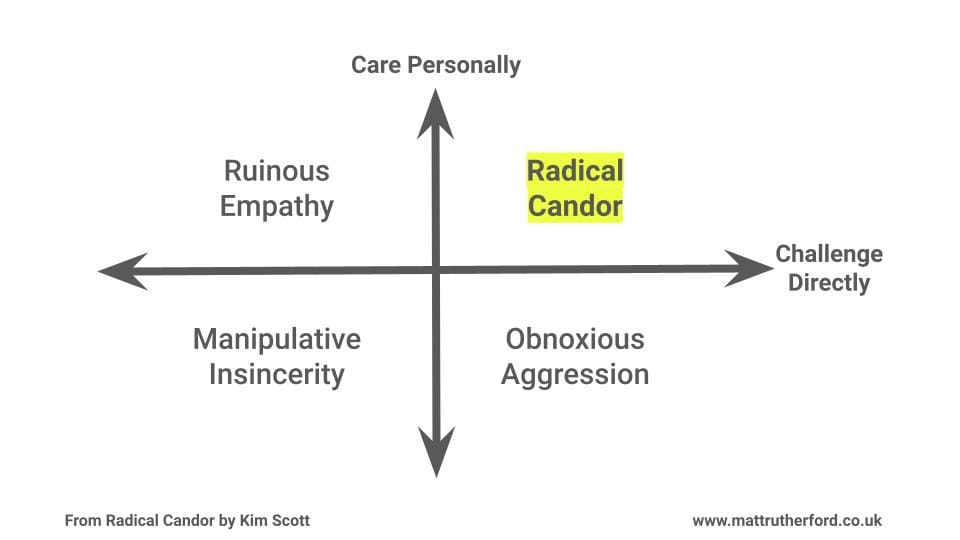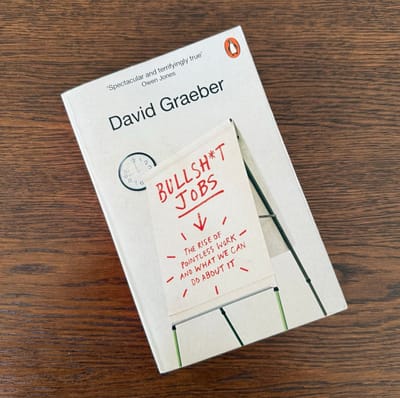Radical Candor by Kim Scott

In 1985, I had a summer job working in a camera shop.
I was there for six weeks, and my boss called me ‘Mark’ throughout. As well as his deep and intimate knowledge of me, the shop owner also used to scream loudly across his shop when things weren’t going as he liked. Sometimes the shouting used to take place in his tiny office, with added personal attacks and humiliation.
My departure at six weeks was my choice, not his.
At the core, Radical Candor is a simple idea: 'Care personally for your colleagues while also challenging them directly.’
This means being open and honest with your feedback but doing so in a way that shows you genuinely care about the person's development and well-being.
It sounds simple, but like my old boss, behaviour around feedback is often lacking.
Imagine you're working on a project, and you've just presented your progress to your boss. Instead of just saying "good job" or giving vague criticism, a boss practising Radical Candor might say, "I see you've put a lot of effort into this, and I really appreciate it. However, I believe if you approach this section differently, it could significantly improve the outcome. Let's discuss how we can make it better."
This approach not only provides clear, constructive feedback but also reinforces the boss's support and confidence in the employee.
If I could go back in time and coach my boss, I’d start with the need to get my name right. Then I’d move on to how you deliver feedback.
"Radical Candor" by Kim Scott teaches the art of improving work relationships through caring deeply while being candid. It offers practical advice for managers and employees to foster a culture of direct feedback, mutual respect, and personal growth.
I enjoyed Radical Candor, it clearly lays out a way to improve relationships through good feedback dialogue, using common sense principles.
I’d recommend this to anyone who struggles to establish those dialogues, and who wishes to improve their feedback skills.
Key Takeaways from Radical Candor
1. The Radical Candor Quadrant
Scott introduces a helpful quadrant to understand interactions in the workplace:
- Radical Candor: Where you want to be - caring personally while challenging directly.
- Obnoxious Aggression: Challenging directly without caring personally. This approach often comes off as abrasive or uncaring.
- Ruinous Empathy: Caring personally but failing to challenge directly. This can lead to a lack of clear feedback and hinder growth.
- Manipulative Insincerity: Neither caring personally nor challenging directly. This is often seen in passive-aggressive behaviour or backhanded compliments.

2. Building Trust Through Personal Connections
You cannot jump into giving harsh/constructive feedback without first setting up a relationship of trust and respect. Scott emphasises getting to know your colleagues on a personal level.
Work to try and understand aspirations, their fears, and what motivates them. This doesn’t mean prying into personal lives but rather showing genuine interest and empathy in their well-being.
3. Encourage Feedback About Yourself
Radical Candor is a two-way street. Encourage your team to give you feedback as well. This can be daunting, but it's crucial for creating an open, transparent culture where everyone feels valued and heard.
By leading by example, you can create an environment where feedback is seen as a tool for growth rather than criticism.
4. Be Clear, Not Mean
Being direct does not mean being harsh. The goal is to provide feedback that is both honest and constructive. Avoid personal attacks or vague comments.
Instead, focus on specific behaviours that can be improved and offer suggestions on how to do so.
5. Take Action on Feedback
Receiving feedback is just the first step. The real growth comes from acting on it. Show your team that you value their input by making changes based on their suggestions.
This process encourages a culture of continuous improvement and shows that feedback is taken seriously.
Implementing Radical Candor
Adopting the principles of Radical Candor can transform the dynamics of your relationships at work.
My recommendation is to start small by practising giving and receiving feedback with a mindset of personal care but also with direct challenge.
Over time, this approach will improve work quality but also strengthens relationships within your team.
Radical Candor is about mutual growth and understanding. It’s a journey that requires patience, practice, and intention. But the results are worth the effort.
Feedback Examples using Radical Candor
Example 1: Project Presentation
Before: "That presentation was really confusing."
After (Radical Candor): "I appreciate the effort you put into the presentation. To make your points clearer, maybe we can streamline the slides and focus more on the key data. Let’s work on this together."
Example 2: Meeting Participation
Before: "You didn't contribute much in the meeting today."
After (Radical Candor): "I've noticed you were quiet in today’s meeting. I really value your insights and would love to hear more from you. What can we do to make you feel more comfortable sharing your ideas?"
Example 3: Handling a Deadline
Before: "You missed the deadline, which is unacceptable."
After (Radical Candor): "I know you’ve been juggling a lot, and I see your hard work. Missing this deadline, however, puts the team behind. Let’s figure out together how we can help manage your workload better for future projects."
Each scenario demonstrates how balancing direct feedback with personal care leads to more effective communication and better relationships at work.
Asking for feedback with Radical Candor
Asking for feedback using the principles of Radical Candor involves being open and receptive while encouraging honesty and directness from others.
In my experience, asking for specific feedback increases the chances of actionable responses. Vague questions like ‘What should I get better at?’ are unlikely to get what you need, here are some examples of specific questions.
Example 1: After Completing a Project
Asking for Feedback: "I just wrapped up the X project and would really appreciate your thoughts on my execution. Could you share your honest feedback on what went well and what I could improve for next time?"
Example 2: After a Presentation
Asking for Feedback: "I value your opinion and would love to know how you think my presentation went today. Could you please give me some candid feedback on both my delivery and the content?"
Example 3: During Performance Reviews
Asking for Feedback: "As I aim to grow in my role, it’s important for me to understand my areas for improvement. Can you provide specific examples of where you think I could do better and any successes that stood out to you?"
Example 4: In Regular One-on-One Meetings
Asking for Feedback: "I’m working to improve my skills and contribute more effectively in my role. Could we discuss areas where you see potential for my development? I’m particularly interested in any critical feedback you might have."
Example 5: When Learning a New Skill
Asking for Feedback: "I’ve been working on improving my [specific skill], and I would really appreciate your feedback. Do you think I’m on the right track, or are there adjustments you’d suggest?"







Member discussion